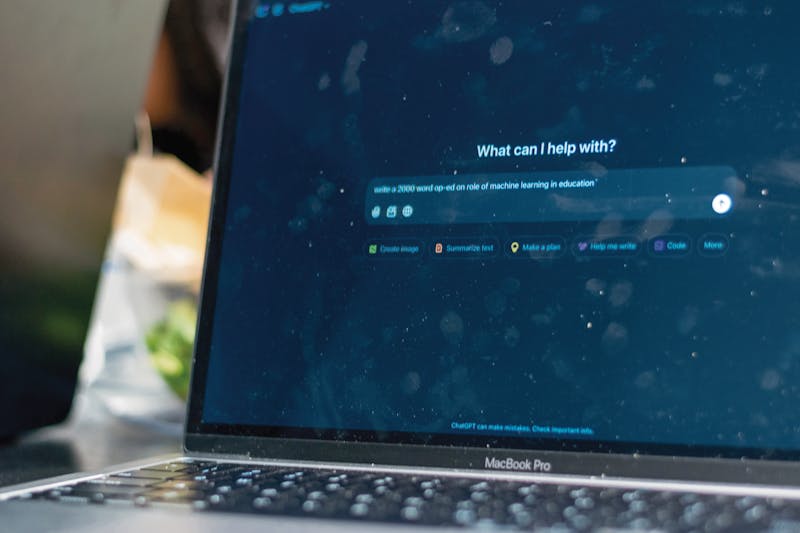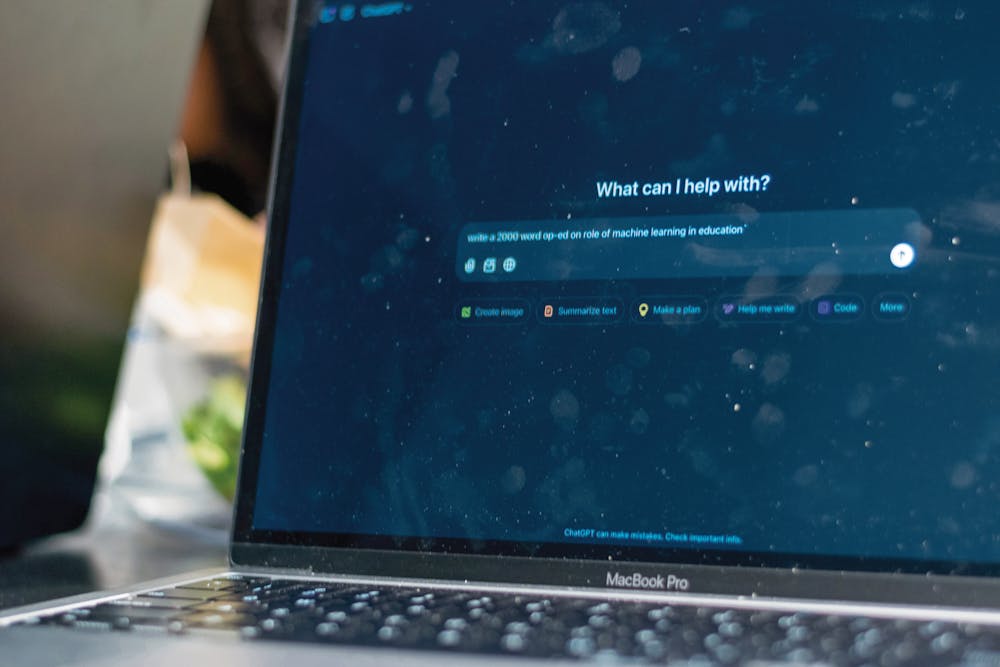Ananya’s Analysis | Artificial intelligence can’t replace the liberal arts
By Ananya Shah
43 minutes ago
Senior Columnist Ananya Shah asserts that liberal arts education will remain a lasting pillar in the era of AI.
Credit: Devansh Raniwala
On the first day of class, I found myself zoning in and out as each of my professors dutifully recited their artificial intelligence policies; all six of one, half a dozen of the other, as they say. Later that evening, when I scrolled through Instagram and LinkedIn, I couldn’t escape the endless stream of AI startup announcements — companies fresh out of Y Combinator, proudly branding themselves as the future. AI has become ambient in our lives, woven into every conversation, every industry update, every casual scroll — for better or for worse. It is no longer a tool we occasionally use, but a constant hum in the background of modern life.
As a student in the College of Arts and Sciences, pursuing a liberal arts degree alongside millions of others across the world, I’m no stranger to the critique: The humanities are “impractical,” “unemployable,” or simply the punchline of tired jokes about baristas with philosophy degrees.
In an economy obsessed with immediate returns, the liberal arts can seem frivolous. But in an age when no one can say for certain which professions will even exist in a decade — when AI could just as easily generate a financial model as a press release — I am increasingly convinced that the liberal arts will endure, perhaps more than anything else.
The truth is, we’ve become so desensitized to AI’s presence that we hardly notice how deeply it shapes our thinking — or how it discourages us from thinking at all. We outsource even the most trivial decisions, like picking outfit combinations and writing emails, as well as more consequential tasks, like using AI as a kind of parasocial therapist.
In education, its misuse is especially striking. Few of us can honestly claim we’ve never leaned on AI to draft an essay, brainstorm an argument, or finesse a discussion post. The temptation is ever present. But every time we paste a prompt into ChatGPT and let it do the intellectual heavy lifting, we cede a little more of what makes us human — our capacity for critical thought. We are actively becoming lazier and more willing to settle for surface-level answers. What gets lost is the ability to wrestle with ideas, to sit with the discomfort of not knowing, to embrace the long, messy process of genuine understanding.
That is precisely what a liberal arts education demands. It forces you to read closely, to analyze critically, and to make connections across history, literature, philosophy, and politics. It trains you to grapple with uncertainty instead of covering it up with a neatly packaged answer. In a world where AI promises efficiency above all else, the liberal arts insist on something slower, more uncomfortable, but infinitely more human: the discipline of thought.
Professional training — like, say, at the Wharton School — undeniably has its value. It offers access to powerful networks, technical expertise, and clear career pipelines. But the reality is that many of those professional roles are already being reshaped or even entirely replaced by AI. Some AI models can now replicate a striking percentage of a junior banker’s tasks. Goldman Sachs CEO David Solomon noted a project that once took a team of analysts six weeks to finish can now be 95% completed by AI in just minutes. While those jobs won’t disappear entirely, their nature will transform in unpredictable ways. Efficiency will rise, but human contribution will shrink.
What AI cannot do, however, is think. It cannot wrestle with ambiguity or construct meaning. It cannot trace the arc of history, weigh competing ethical claims, or uncover the emotional resonance of a poem, because AI ultimately cannot replicate the human experience.
Even as Microsoft and other firms release reports warning that roles like political scientists, English professors, and historians are “at risk,” I remain convinced that these very disciplines — rooted in the liberal arts — will prove the most resilient in the age of AI. These disciplines are inherently focused on asking better questions and pursuing intellectual curiosity, as opposed to quick answers. They are, in essence, the last safeguard of uniquely human thought.
ANANYA SHAH is a College sophomore studying philosophy, politics, and economics from Atlanta. Her email is aoshah@sas.upenn.edu.
The Daily Pennsylvanian is an independent, student-run newspaper. Please consider making a donation to support the coverage that shapes the University. Your generosity ensures a future of strong journalism at Penn.

